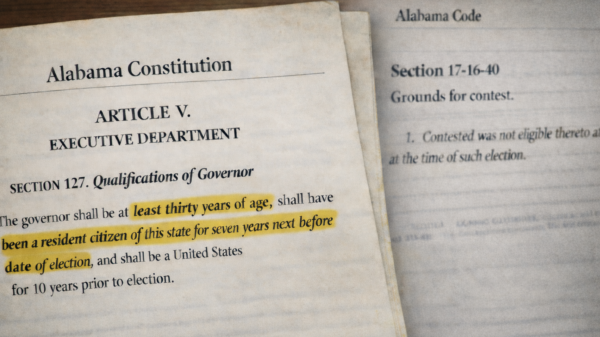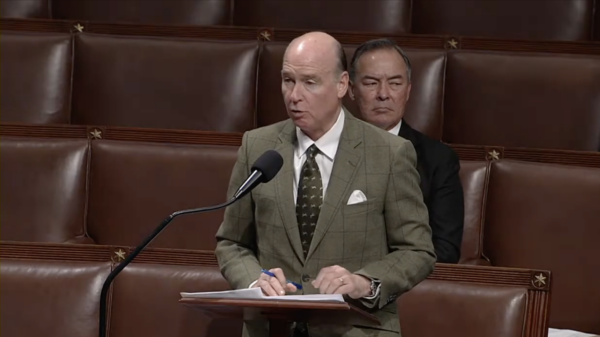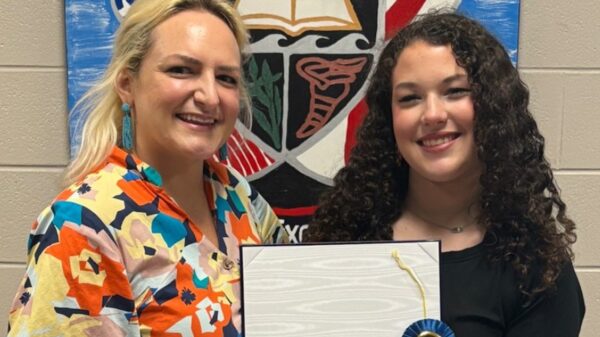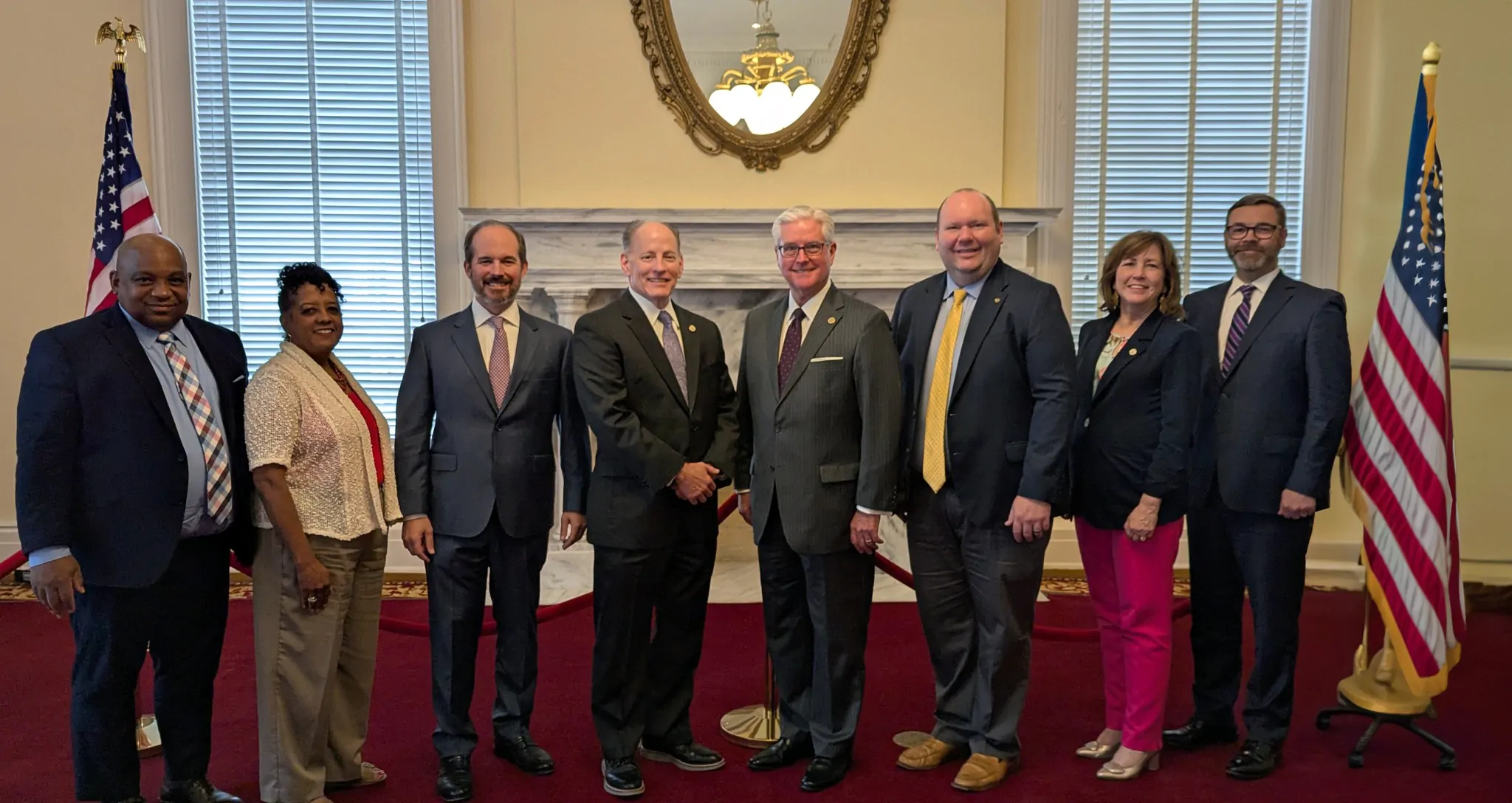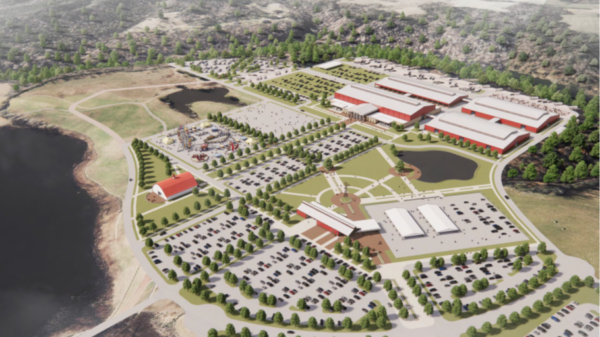Members of the Alabama Veterans Resource Center Board discussed their plans to improve support programs for Alabama’s veterans during the board’s inaugural meeting on Thursday.
The board’s members, who were appointed by the governor, Senate president pro tem and speaker of the House, were approved by Alabama Governor Kay Ivey late last month.
Board members, comprised of leaders in Alabama’s state government and the private sector, spoke regarding their individual expertise and goals for the board’s operations.
The meeting was held in the Alabama State Capitol’s original archives room.
Chair of the board and Secretary of the Alabama Department of Workforce Greg Reed opened the meeting by expressing his thanks to board members and the parties responsible for the board’s creation, as well as Alabama’s veterans.
“I would like to again say to each of you, as board members, thank you for your willingness to serve. I want to also thank Governor Ivey and the Alabama House and the Alabama Senate for adopting the legislation that set up the Veterans Resource Center,” Reed said. “Also, I want to thank the veterans that call Alabama home. We’re thankful for their service to our state and to our nation. Now Alabama wants to serve them.”
Alongside Reed, board members in attendance included Vice Chairman, Commissioner of the Alabama Department of Veterans Affairs and retired U.S. Air Force Brigadier General Jeffrey Newton, Commissioner of the Alabama Department of Mental Health Kimberly Boswell, Executive Vice President and CFO of Jim Wilson and Associates Ronald Brown, President and COO at Huntsville Hospital Tracy Doughty, House Minority Leader Anthony Daniels, D-Huntsville, state Senator Andrew Jones, R-Centre, Director of the Alabama Office of Minority Affairs Stacia Robinson and Government Relations Adviser at Maynard Nexsen Carter Wells.
Board members, Senate Minority Leader Bobby Singleton, D-Greensboro, and Volkert Senior Vice President of External Affairs George Talbot were absent from the meeting.
“The master key to veterans’ well-being is getting the transition right from military service to civilian service,” Newton said, expressing his hope that the services provided by the resource center will become a “one-stop shop” for assisting Alabama’s veterans in their transition to civilian life.
“If it’s a job, a mental health issue they’re having, they need help with their veterans’ benefits, we’re gonna take care of that,” Newton said.
Jones, the chair of the Alabama Senate Veterans Affairs, Military and Public Safety Committee, who fronted the legislation that founded the resource center during the 2025 Legislative Session, said he hoped the board would help continue improvements to Alabama’s veteran support initiatives.
“I think this—this board and the members here, their service on the board will help fill in some much-needed gaps and help take us to the next level in serving and giving back to the veterans who’ve given so much to us,” Jones said.
Jones also spoke on the origins and structure of the legislation that founded the AVRC and its governing board. The senator told the board the idea for the AVRC first came from representatives from the Alabama Power Foundation, after which he, alongside state Representative Ed Oliver, R-Dadeville, pushed for its creation in the legislature.
Jones highlighted his legislation’s outlining of the board’s duties, which include assisting veterans in accessing federal and state benefits, career counseling and job placement services, mental health and wellness programs, education and training opportunities, and support for their spouses, dependents and families.
The senator also pointed to the legislation’s call for the board to establish a central office, as well as a network of regional offices “through a public-private partnership,” alongside potential outreach initiatives such as an online portal for veterans to learn about the AVRC’s services.
Jones expressed his hope that pre-existing veteran support initiatives, such as Jacksonville State University’s Victory Center, will become AVRC partners.
“Entities like that, that are currently doing great work—I feel like we need some coordination of effort. It would be great to wrap our arms around what everyone in the state is doing and how they all fit together into a network, and how we as establishing a main central hub, can coordinate with all these networks,” Jones said.
Robinson, a veteran of the U.S. Air Force, spoke on her transition from military to civilian life, her previous work helping to set up Alabama’s initiatives to support veterans returning from service, and hopes that her service on the board will help improve Alabama’s support structure for veterans transitioning to civilian society.
“Teaching [veterans] how to engage with the community is a huge gap at the beginning of their time going from here to there,” Robinson said. “So, serving on this board will be a great way to actually add whatever context and perspective, having lived it, to do this, so I’m excited to be here as well.”
Brown described his hope that the resource center would serve as a “clearing house” to help veterans’ health, wellness, education and sense of purpose as they transition to civilian life.
Wells pointed to his upbringing in Madison County and his goal of improving opportunities throughout the state for veterans through public and private-sector collaborations.
“There are a tremendous number of veterans in North Alabama, but then there are also a lot of opportunities for veterans with some of the contractors, some of the work that goes on in Huntsville and the surrounding counties,” Wells said.
“I’m just glad to see you have private sector and public sector working together on this, and I think that will only enhance the networks and connectivity for the benefit of veterans across the state,” he continued.
Doughty expressed his desire to help tackle food insecurity, mental health concerns, job placement, healthcare access and transportation for veterans returning from service.
“Hopefully, we can look at some of those issues and tackle them head-on. I’m here to serve,” Doughty said.
“In our world, we know that a job can be the absolute best mental health medication, because it gives folks a sense of purpose,” Boswell said. “And so, we really want to make sure we are integrating mental health services into the conversation.”
The board unanimously voted to approve the ratification of its incorporation application process, finalizing its establishment as a state entity, as well as the ratification of the board’s bylaws.
Reed went on to discuss AVRC’s need for a central office.
“If we don’t have a house, then we’re not gonna be able to do a lot,” the chair said.
Reed said he is currently considering Montgomery as the site of AVRC’s central location, asking the board for its thoughts on the resource center’s central location being in the state’s capital.
The chair also highlighted the $5 million appropriation awarded to the resource center by the legislature to establish its operations and also called for the board to examine how it can utilize technology to reach veterans and help them understand the services offered by AVRC.
Newton pointed to veteran support services offered at Middle Tennessee State University, one of the “model programs” AVRC has examined while brainstorming how to best establish its operation, saying an office on Troy University Montgomery or Alabama State University’s campuses could serve as a good base of operations.
Newton and Reed also proposed a potential board trip to MTSU’s campus in Murfreesboro, Tennessee to learn more about the university’s veteran support programming.
“[There are] a lot of veterans at our colleges here in town,” Newton said.
Robinson added that a partnership with the Alabama Department of Workforce’s local career centers could help promote local access to ACRC’s services throughout the state, with the department currently operating locations in every Alabama county.
Brown agreed to work with Reed to investigate potential locations for the resource center’s central office within Montgomery with proximity to education resources.
The chair said his goal was for the office to have a central location established by Christmas.
“That may be really aggressive, but why not be aggressive?” Reed told the committee. “I think we’re up to the task unless you tell me different.”
Reed also discussed the need for an executive director of AVRC.
“We need to be looking for someone who can pour their life into this opportunity to be able to serve veterans, in my opinion,” the chair said.
Newton said he had drafted a proposal for what to look for in a candidate for executive director, which he would share with the committee. Wells and Doughty agreed to help Newton begin further developing a plan for finding an ideal candidate.
“If I can find the right person, now’s the moment,” Reed said, clarifying that he felt finding an ideal candidate for the position was more important than filling the seat quickly.
Reed also briefly discussed the potential creation of an AVRC foundation to help further fund the resource center’s operations.
“The great news is you’ve already got folks that are interested in what we’re doing,” Reed said. “They have already said we would like to establish some 501(c)(3) type entity that’s going to be able to raise funds that would help with what is going on, and that there would be you know business entities that may want to participate in a way that would add additional resources to some of the things we’re able to do to be able to support veterans.”
Reed said he was committed to returning for the board’s next meeting with proposals that begin to outline the proposed foundation’s structure.
The chair closed the meeting by calling on all board members to raise public awareness, through social media, of the new board’s existence.
“We want to start a slow but louder drum beat that we’re doing this for veterans and this is something important in the state of Alabama,” Reed said.
The AVRC board’s next meeting is planned for the afternoon of October 16.


